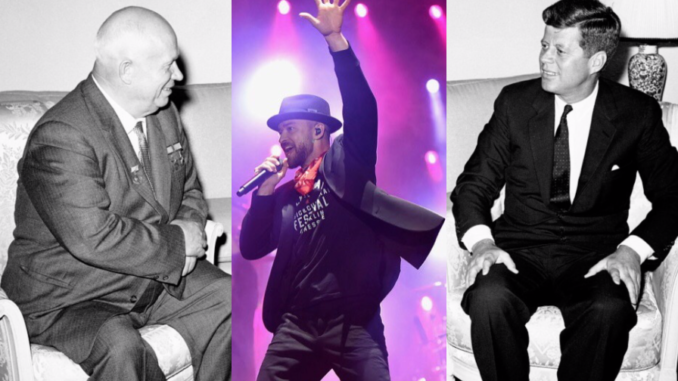
Yo, the name’s Justin Timberlake and I’m the creative genius behind the 2006 hit “SexyBack.” I’ve been called “the most talented artist of our generation,” “sex on legs,” and “sex on arms.” But even really cool hot dudes like me can make mistakes. Jk bros, I never make mistakes. Sometimes people don’t get that I’m, like, super crazy smart.
Bros keep trying to tell me that “SexyBack” is about “grinding on girls,” “kinky hookups,” or “bringing sexy back (yeah).” And that makes me, Justin Timberlake, writer of “SexyBack,” really sad because that’s, like, not what it’s about at all. So I thought maybe it’s about time I cleared up any confusion.
“I’m bringin’ sexy back (yeah)”
The Cold War was a period of geopolitical tension between the Soviet Union and the United States following World War II. In this line, I’m clearly using “sexy” to mean “generally attractive or interesting,” which is how the United States described capitalism at the time. Clearly “I’m bringing sexy back” means “I’m bringing capitalism back.”
“Them other boys don’t know how to act (yeah)”
Here, “other boys” is a reference to the Soviet Union, a self-proclaimed Marxist–Leninist state that imposed a totalitarian regime which exercised full control of the country, a decidedly un-democratic idea. Because of this, the United States, a capitalist democracy, believed they “didn’t know how to act.”
“I think it’s special, what’s behind your back (yeah)”
Though the US and the USSR never engaged directly in armed combat, both were heavily armed in preparation for a possible all-out nuclear world war, developing nuclear weapons “behind their back.” This line is also a reference to the Space Race, which led to the United States’ development of technology in secret (a.k.a. “behind the back” of the USSR) and culminated in the Apollo Moon Landings, which truly was something “special.”
“So turn around and I’ll pick up the slack (yeah)”
Each side had a nuclear strategy that discouraged an attack by the other because of the doctrine of mutually assured destruction (MAD). With the threat of war ever-present, this line is the US warning the USSR that if they “turned around” and let their guard down, the US would not hesitate to “pick up the slack” and launch a nuclear attack.
“Dirty babe
You see these shackles, baby
I’m your slave”
Following the Bay of Pigs invasion, the Kennedy administration continued to seek ways to oust Fidel Castro. In response, Khrushchev made preparations to install nuclear missiles in Cuba. Forced to back down under the threat of nuclear war, the United States was indeed a “slave” of the USSR, “shackled” by the fear of being destroyed by the USSR (the “Dirty babe”).
“I’ll let you whip me if I misbehave”
The meaning behind this line is two-fold. First, it’s the United States acknowledging that if the USSR had constructive feedback about democracy, they were open to hearing it, a.k.a. open to being “whipped” if they “misbehaved.” Second, it was a reference to the Korean War and series of other proxy wars fought indirectly between the United States and communist governments like the USSR. This line represents the US acknowledging that they could lose the war if they miscalculated (again, they’d be “whipped” if they “misbehaved”).
“Come here, girl (go ‘head, be gone with it)”
Here, the “girl” is Nikita Khrushchev, leader of the Soviet Union from 1953 to 1964. He was ousted by his Kremlin colleagues in 1964 when they accused him of bringing the world to the brink of nuclear war and said “go ‘head, be gone with it!”
“Come to the back (go ‘head, be gone with it)”
However, Khrushchev was not assassinated and was, instead, allowed a peaceful retirement in “the back.”
“VIP (go ‘head, be gone with it)”
Here, VIP stands for Vietnam Is a Proxy (war). Under President John F. Kennedy, US troop levels in Vietnam grew under the Military Assistance Advisory Group program from just under a thousand in 1959 to 16,000 in 1963. The Tet Offensive in 1968 gave rise to what was referred to as Vietnam Syndrome, a public aversion to American overseas military involvement. This sentiment is echoed in my lyrics, as the American public is saying “go ‘head, be gone with [Vietnam]”!
“Drinks on me (go ‘head, be gone with it)”
By the early 1980s, the USSR had built up a military arsenal and army surpassing that of the United States. Soon after the Soviet invasion of Afghanistan, President Carter began massively building up the United States military. This buildup was accelerated by the Reagan administration, culminating in the largest peacetime defense buildup in United States history. I wanted to make the line “the military spending increase to 6.5 percent in 1986 on me (go ‘head be gone with it),” but my producer said it didn’t have as much of a ring to it.
“You see what you’re twerking with (go ‘head, be gone with it)”
This line is self-explanatory.
Aight bros, I think y’all can figure out the rest of the song. Luckily for my fans, I wrote the lyrics in a way that’s meant to, like, make you think critically, so there truly are no wrong interpretations. Just remember that, like, life’s an adventure, and if you ever feel lost just make like the USSR and “Get your sexy on.”
Justin out.
